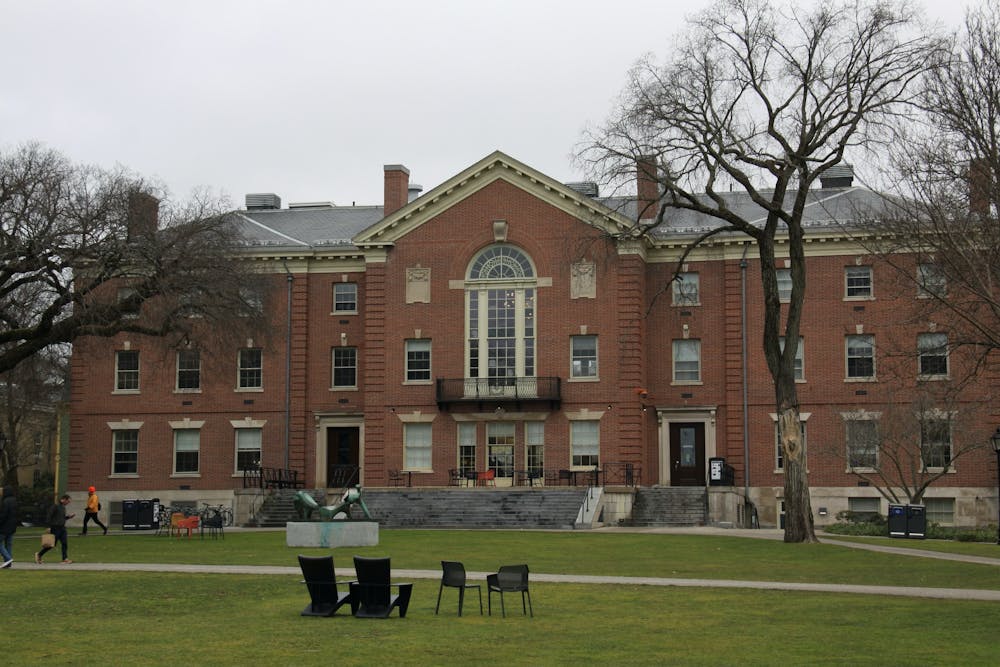A committee of University faculty will now evaluate the severe sanctioning of any faculty member, including suspension from regular service, following a vote at a Tuesday faculty meeting.
Following amendments, the motion passed with 64% in favor, 26% against and 10% abstaining from the vote. The committee, which will be created on an ad hoc basis, would include three to seven tenured faculty members and review the charges by the dean made in the case.
The motion was introduced by Steven Sloman, chair of the Faculty Executive Committee and professor of cognitive, linguistic and psychological sciences. It revises the current Faculty Rules and Regulations. Currently, an ad hoc committee of peers is only formed in the case of dismissal.
During the meeting, faculty members also passed motions recommending President Christina Paxson P’19 P’MD’20 and the Board of Fellows to establish a Masters of Engineering in Biomedical Engineering program and the Masters of Science in Health Informatics. Faculty also voted to recommend the renaming of the Department of Cognitive, Linguistic and Psychological Sciences to the Department of Cognitive and Psychological Sciences, due to the separation of linguistics from the department.
Sloman stated that the new ad hoc committee would promote due process and protect academic freedom, which has been a major concern for faculty this academic year. In December, faculty voted to integrate the Committee of Grievance and the Procedural Integral Committee, which reviews policy violations and promotion denials, respectively.
During the “Gaza Solidarity Encampment,” several faculty members received warnings of potential disciplinary action for alleged involvement in the encampment. Paxson later clarified that no faculty were under investigation for policy violations and apologized for notices sent to faculty members.
But, various faculty members expressed concerns with the details of the motion, specifically the definition of severe sanctions.
“The vagueness of this motion matches the vagueness of sanctions,” said FEC Vice President Kristina Mendicino, professor of German studies, citing the danger of limiting what sanctions the committee could address.
According to the initial motion, a dean would also have the ability to decide whether to disclose the name of the individual who raises the concern about the faculty member, prompting several faculty to raise concerns.
“I completely understand that one would not want to establish a policy that would discourage untenured colleagues from raising a complaint about a decision that may be made upon the part of someone who is tenured and speaking from a more secure professional position,” Mendicino replied. She stated that the dean can “choose not to disclose the name of the complainant so long as the rationale is provided in writing.”
Brian Lander, professor of history and environment and society expressed his support for the disclosure, citing the importance of administrative transparency.
“Several times since I’ve been at Brown, there have been people dismissed or punished in circumstances where nobody has been told what’s going on at all. And sometimes, important people in the department like administrators are just fired within one day and we’re not allowed to talk about it,” he said.
“I think that on one hand, we do need to protect people who want to speak out, but on the other hand, I can’t think of any better way to create suspicion in the administration and to have all of these things be secret,” he said. “So I think that this rule does add a certain element of transparency to the process.”
Dean of the Faculty Leah VanWey expressed worries about the individuals on the ad hoc committees including only tenured faculty: “The tenured faculty are not, in fact, a peer group for the postdocs or the adjunct faculty or the clinical faculty, or a whole range of people in our community,” she said.
Mendicino acknowledged the imperfections of the motion but expressed her view that a group of faculty members would serve as a “jury of peers” more effectively than if faculty were not involved in the decision-making process.
After discussion, VanWey suggested the exclusion of postdoctoral researchers and others included in the Brown Postdoc Labor Organization bargaining unit from this motion, citing ongoing negotiations. She noted that the committee of tenured faculty members that would be assigned to their case would not be considered peers.
The motion to remove this group from the motion passed with 86% in agreement.
Mendicino also proposed amendments to the motion, including the addition of a training requirement, ensuring ad hoc committee members know how to deal with sensitive matters, which passed with 88% in favor.
Faculty members such as Kenneth Wong, former chair of the FEC and professor of international and public affairs, and Provost Frank Doyle expressed interest in putting select measures for due process and transparency in place, allowing time for the motion to be clarified and strengthened before reintroduction in the fall.
In response, Mendicino expressed the need to pass the motion to provide support for colleagues as quickly as possible by passing the motion. But, throughout the meeting, she emphasized the importance of more thoroughly reviewing faculty rules in the upcoming months.

Cate Latimer is a university news editor covering faculty, University Hall and higher education. She is from Portland, OR, and studies English and Urban Studies. In her free time, you can find her playing ultimate frisbee or rewatching episodes of Parks and Rec.





